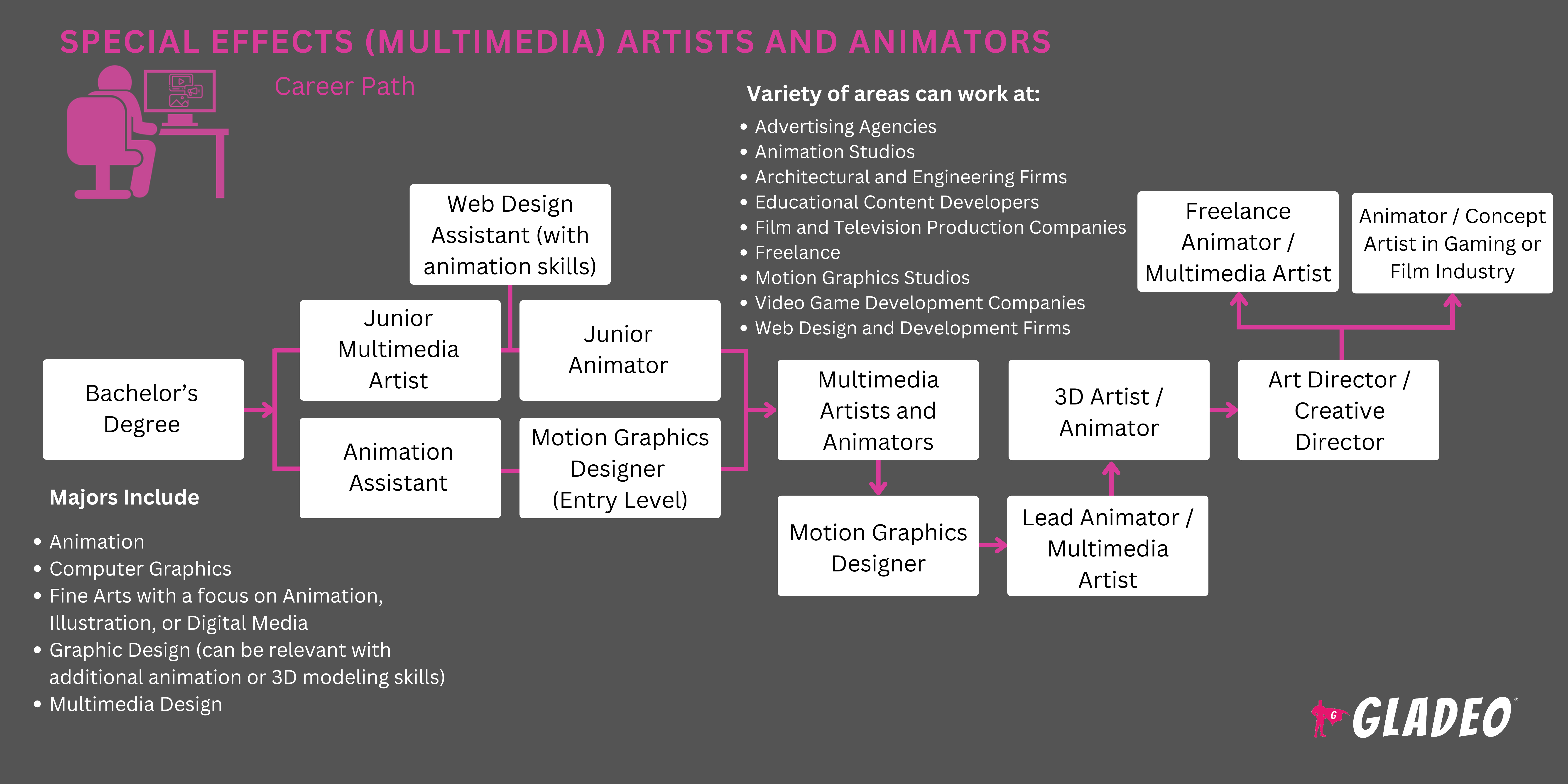聚光灯
又称3D动画师、数字艺术家、插画师、多媒体制作人、动画师;计算机设计零件
我们都看过那些运用计算机生成图像(CGI)打造惊艳视觉特效(VFX)的动画剧集或电影。这些令人叹为观止的作品,正是由才华横溢的多媒体艺术家——也就是特效师和动画师们——精心打造而成!
特效艺术家和动画师与导演、制片人及其他创意专业人士紧密合作,共同开发并实现视觉特效以增强叙事效果。他们的工作让富有想象力的角色和世界在电影、电视剧、广告及电子游戏工作室中栩栩如生。
该职位需要艺术与技术能力的特殊结合,以设计、渲染和合成真实或奇幻元素,并将其无缝融入实景镜头。随着先进人工智能工具的广泛应用,这个充满活力的领域正经历快速变革,要求艺术家保持灵活应变并持续学习。
- 将富有想象力的创意概念融入游戏、影视作品中,使其焕发生机
- 接触尖端技术的工作机会
- 与创意团队合作开展高知名度项目
- 看到你的作品被全球观众所喜爱
工作日程
特效艺术家和动画师通常全职工作,为赶工期加班是常态。工作环境涵盖工作室、制作公司及远程办公等多种形式。
任务时长取决于制作类型。例如,短片项目可能仅需数日完成,而全动画剧集与电影项目则可能耗时数月乃至数年。涉及大量视觉特效(VFX)的实景电影,其前期概念设计与后期制作同样需要数月才能完成。
经验丰富的艺术家可担任预可视化及现场监督工作。他们与导演和摄影指导协作,就绿幕布景设置、动作捕捉、追踪标记以及特定镜头运动提供指导,这些环节为后期特效的添加奠定基础。
典型职责
- 与项目团队会面,讨论需求和时间框架。
- 根据项目需求,研究并实施设计或动画方案。
- 绘制视觉效果草图或分镜脚本,以便在制作前明确特定效果的呈现效果。
- 使用计算机软件设计、建模、贴图和动画化角色、物体及环境。
- 通过操控光线、色彩、纹理、阴影和透明度,使物体和角色呈现更逼真的效果。
- 模拟爆炸、火焰、水流等物理效果及其他动态元素。
- 根据导演、动画师或客户的反馈修改动画和特效。
- 将视觉特效与实拍画面融合,确保无缝衔接与逼真效果。
- 确保所有特效元素的一致性与质量控制。
- 排查并解决与渲染、合成和动画工作流程相关的技术问题。
正如《大学公报》所写:"视觉特效主要可分为三大类——计算机生成图像(CGI)、合成技术和动作捕捉(MOCAP)... CGI技术可用于创建几乎任何事物的3D模型。合成技术需要绿幕环境,通过处理两个相距甚远的元素使其看起来置于同一场景。动作捕捉技术正如其名——记录演员的肢体动作与面部细微表情,并将其应用于CGI角色或物体上。"
附加职责
- 创作墨水插画或素描,扫描后转化为数字动画。
- 利用光学扫描等建模技术,将真实物体转化为动画形态。
- 组装并排版数字资产以供生产使用。
- 模拟动画对象的行为以创建逼真的运动效果。
- 为动作捕捉表演添加视觉特效。
- 通过返老还童技术或CGI增强技术调整演员的特征。
- 与特技协调员、特效团队及其他部门协作,确保视觉特效与实景场景协调一致。
- 开发促销产品及营销演示文稿。
- 跟踪修订情况。创建操作指南和连续性文档。
- 随时掌握最新的行业软件、工具和技术动态。
软技能
- 积极倾听
- 适应性
- 注重细节
- 协作
- 沟通
- 概念化能力
- 创造力
- 决策
- 注重细节
- 灵活性
- 组织能力
- 原创性
- 耐心
- 坚韧
- 规划
- 问题解决
- 团队合作
- 时间管理
- 视觉叙事
技术技能
- 360度视频制作工具
- 3D建模与纹理制作
- 动画软件(例如:Maya、Blender)
- 人工智能工具
- 色彩理论与照明
- 计算机编程与视觉特效制作流程
- 数据可视化工具(Tableau、Power BI)
- 数字资产管理系统
- 视觉特效软件,例如Adobe After Effects、Maya、Nuke等。
- 数字特效与后期制作流程
- 游戏引擎(Unity、虚幻)
- 平面设计与视频编辑软件(Adobe Creative Cloud、Final Cut Pro、Canva)
- 多媒体格式、压缩与文件管理
- 照片编辑工具如Lightroom
- 物理学与解剖学在真实感动画中的应用
- 诸如Python和C++之类的编程语言
- 项目管理技能
- 构图与场景布置
- 视频剪辑、动画制作或平面设计专业技能
- 虚拟现实(VR)与增强现实(AR)内容
- 广告公司
- 动画工作室
- 影视制作公司
- 自由职业机会
- 电子游戏开发商
- 视觉特效工作室
该职位需要兼具艺术才能与技术造诣,同时具备抗压能力。在视觉特效公司工作往往意味着长时间加班,尤其当面临紧迫的截止日期或大量修改请求及新增场景时。
尽管特效制作周期往往紧迫,特效艺术家和动画师仍需产出符合甚至超越观众高期待值的优质视觉内容。仓促或"劣质"的视觉特效可能毁掉一部耗资巨大的电影声誉,导致票房表现不佳并损害制片厂的财务状况。
流媒体平台彻底改变了娱乐产业格局,观众如今对几乎每部影视作品都要求具备高品质的视觉效果。值得庆幸的是,特效与动画领域已能应对这一挑战——先进软件正重塑视觉特效与动画的制作方式。艺术家们如今能为电影、剧集、游戏及其他项目打造出前所未有的精细场景、角色与动态特效。
传统实景特效在电影领域依然占据一席之地,但多数电影制作人已广泛采用数字工具,例如返老还童技术和计算机生成图像(CGI)。这些工具通过简化复杂流程,使专业级特效效果也能为小型团队所用。它们赋予创作者无缝融合数字元素与实景拍摄的能力,最终呈现的视觉效果如此自然,观众甚至难以察觉自己正在观看视觉特效。
与此同时,增强现实和虚拟现实等技术正助力游戏美术师打造出精妙的模拟场景、逼真的角色设计以及令人惊叹的实时叠加效果!
特效艺术家和动画师通常热爱绘画、讲故事和玩电子游戏。他们很可能对电影视觉特效着迷,会花上数小时精心调整动画效果,或钻研最新软件技术。
- 特效艺术家和动画师通常需要获得数字艺术类院校的证书,或持有视觉特效、动态图像或计算机动画专业的学士学位。
- 常见的视觉特效课程可能包括:
- 3D建模与动画制作
- 人工智能驱动的合成技术
- 人工智能在动画与动态图形中的应用
- 人工智能驱动的视觉特效技术
- 艺术家的解剖学
- 色度键技术(绿幕/蓝幕)
- 布料模拟与特效
- 视觉特效合成
- 昼夜转换技术
- 影视与媒体数字化妆
- 运动匹配与摄像机跟踪
- Maya与NUKE工作流程集成
- 粒子模拟与特效
- 投影映射技术在视觉特效中的应用
- 视觉特效中的烟火与爆炸
- 扩展设置与环境创建
- 立体(3D)效果与深度营造
- 时间扭曲与慢动作效果
- 许多学生通过临时性在线课程、自学实践或独立参与
视频项目来提升技能。传播学、领导力、团队建设、冲突解决及项目管理等课程均能提供有效帮助。 - 在相关软件方面具备实操经验至关重要。在线课程是学习新技能的绝佳途径!众多可选认证能为简历增色,例如:
- Adobe Systems Incorporated – Adobe After Effects认证专家
- 苹果计算机公司 –苹果认证专家:Logic Pro X
- 欧特克公司 –Maya认证专家
- 认证数字艺术家——视觉特效(动画师)认证
- CG光谱——视觉特效文凭
- Foundry –Nuke认证专家
- Gnomon –数字制作证书
- Rebelway –视觉特效艺术家认证
- SideFX培训
- 一个出色的作品集或效果演示片段有助于展示个人能力。
特效艺术家和动画师并非总是需要大学学位,但对于计划攻读学位的人士,应寻找具备以下特点的课程:
- 由公认的认证机构进行的认证。
- 拥有真实行业经验的讲师。
- 尖端设备和软件,特别是与人工智能相关的。
- 通过在动画与特效工作室实习获得实践经验的机会。
- 与行业专业人士建立联系的机会。
- 灵活的课程安排。
- 职业服务提供就业安置和简历指导。
- 具有竞争力的学费和杂费,以及奖学金和助学金选项。
许多社区学院、文理学院和大学都提供动画、平面设计、视觉特效方向的美术专业以及多媒体艺术等相关学位和证书课程。
诸如Coursera之类的在线平台提供宝贵的临时课程和认证。学生还可选修以下公司的课程:
- Adobe Systems Incorporated – Adobe After Effects认证专家
- 苹果计算机公司 –苹果认证专家:Logic Pro X
- 欧特克公司 –Maya认证专家
- 认证数字艺术家——视觉特效(动画师)认证
- CG光谱——视觉特效文凭
- Foundry –Nuke认证专家
- Gnomon –数字制作证书
- Rebelway –视觉特效艺术家认证
- SideFX培训
另请查阅《大学公报》评选的美国最佳视觉特效(VFX)院校榜单,获取关于Gnomon及其他值得考虑的项目的全面解析!
- 储备艺术、插画、平面设计、计算机编程和通信等课程。
- 切勿忽视软技能的培养!积极参与各类活动,从中学习团队协作、项目管理、组织能力、时间管理以及冲突解决等技能。
- 了解电影特效如何运作:MasterClass 带你掌握四种视觉特效类型指南
- 通过自学和在家练习来提升技能。寻找需要为项目添加视觉特效的朋友和社区成员。
- 考虑在Upwork、Freelancer或其他平台上从事自由职业,既能获得报酬又能积累更多经验!
- 研读书籍、文章和视频教程(参见我们的资源列表 > 网站)。《VFX杂志》和《VFX之声》是值得关注的热门出版物。
- 观看各类电视节目及幕后花絮。记录所见视觉特效,并研究其制作过程。
- 了解一些顶尖的视觉特效公司。阅读它们的发展历程,从中获取创意灵感。
- 询问一位在职的特效艺术家,他们是否有时间与你进行一次信息性面试。
- 尽可能熟悉各种视觉特效技术和软件。
- 创建在线作品集,展示你的技能。通过社交媒体分享作品,建立个人声誉。
- 申请电影实习岗位,参加电影节及电影学院开放日活动,并加入专业组织以学习成长并拓展人脉网络。

- 若你具备足够的学术资质和扎实的作品集,不妨开始在电影行业招聘网站和门户平台(如Indeed、Simply Hired和Glassdoor)申请视觉特效艺术家职位。
- 浏览你心仪的视觉特效公司的招聘页面。争取实习机会或入门级职位,为进入行业打开大门。
- 请询问你的教授、导师和同学是否愿意为你担任个人推荐人。
- 通过在Upwork、Fiverr等自由职业平台接单积累经验。
- 参加电影节,并在行业期刊或热门网站上发表作品。
- 请做好准备,迁往就业率较高的州或城市,如加利福尼亚州、纽约州和得克萨斯州,以最大限度地拓展您的职业发展机遇。
- 登录Quora或在线视觉特效论坛寻求求职建议。
- 请向学校的就业指导中心寻求帮助,获取简历撰写、模拟面试和求职搜索方面的支持。同时,向你的专业人脉网络咨询职位空缺的相关建议。
- 参考视觉特效艺术家简历模板,获取排版与措辞的灵感。查阅招聘广告中列出的关键词,并尝试将其融入简历,例如:
- 3D动画
- Adobe创意套件(Photoshop、Illustrator、Premiere Pro)
- After Effects
- Blender
- 合成
- 计算机生成图像(CGI)
- 概念艺术
- 绿幕/色度键
- 关键帧动画
- 照明/阴影
- 玛雅
- 动态图形
- 粒子系统
- 后期制作
- 实效
- 渲染
- 索具
- 分镜脚本
- 纹理映射
- 视觉特效(VFX)
- 研究视觉特效艺术家面试问题,例如“能否描述一个需要从零开始创建特效的项目?”或“能否详细说明你创建某个特效的具体流程?”
- 在参加面试前,请及时了解行业最新动态并熟悉相关术语。
- 当你接到面试邀请时,请先研究雇主以了解他们的更多信息。
- 面试着装得体,助你成功!
- 面试结束后,发送感谢邮件以表达谢意,并重申你对该职位的兴趣。
- 与你的直接主管讨论职业发展事宜。
- 继续深造,接受培训,并精进专业技能,例如高级视频剪辑、动画制作或动态图形设计。
- 用你最高质量的作品更新作品集和演示视频。
- 在社交媒体、博客或专业平台上分享你的作品,以扩大影响力。
- 与其他创作者和网红合作,扩大你的受众群体。
- 及时掌握行业工具、技术及趋势动态,例如人工智能驱动的工具或新兴媒体格式。
- 主动参与具有挑战性或高知名度的项目,以展现你的抱负与能力。
- 在会议中提出创新想法,并积极争取承担更多职责。
- 指导初级团队成员,并与主管、同事及行业领袖建立良好关系。
- 积极参与专业组织活动。参加行业活动,加入在线论坛或群组,保持人脉联系。
- 始终如一地按时按预算交付项目,赢得信任与认可。
- 通过博客、社交媒体或研讨会分享您的行业见解。
网站
- 美国电影艺术与科学学院
- ACCESS VFX
- ACM SIGGRAPH
- 动作-剪辑-印刷
- 动物逻辑
- 动画公会
- 动画技能网
- 动画世界网
- 视觉特效艺术
- 计算机协会
- 全新学校
- 卡通网络工作室
- 影迷情结及其延伸
- 漫画艺术专业协会
- 数字领域
- 梦工厂动画
- 安可视效
- 电影人杂志
- 电影制作人联盟
- 电影狂欢
- 电影学院弃儿
- 帧存储器
- FX指南
- 独立线
- 工业光魔
- 卢卡斯影业动画
- 卢玛影业
- 方法工作室
- 活动影像公司
- 美国艺术与设计院校协会
- 美国国家漫画家协会
- 美国国家艺术基金会
- 尼克动画
- 无电影学校
- 皮克斯
- 草稿工作室
- 动画研究学会
- 电影与电视工程师学会
- 索尼影视影像工作室
- 学生电影制作人
- 吉卜力工作室
- OpenFX
- 视觉特效杂志
- 视觉特效士兵
- 视觉特效之声
- 视觉特效世界杂志
- 视觉效果协会
- 华特迪士尼动画工作室
- 华纳兄弟动画
- 维塔数码
- 威士忌树
- 连线 - 设计特辑
书籍
- 电影与视频数字合成:制作流程与技术,史蒂夫·赖特著
- 《视觉特效内幕:视觉特效与电影产业的深度解析》,皮埃尔·格拉格与斯科特·罗斯合著
- 《动画师生存指南》,理查德·威廉姆斯著
- 《3D计算机动画与特效艺术》,作者:艾萨克·克洛
特效师或动画师的工作意味着长时间加班,承受着巨大的压力,必须让作品完全符合导演、制片人或主管的要求。这虽是份回报丰厚且充满活力的职业,但若想探索更多可能性,不妨考虑以下职业!
- 艺术总监
- 书籍插画师
- 漫画书插画师
- 计算机程序员
- 文案撰稿人
- 服装设计师
- 创意总监
- 数字营销专员
- 主任
- 参展艺术家
- 电影与视频剪辑师
- 游戏设计师
- 平面设计师
- 市场营销协调员
- 摄影师
- 播客制作人
- 公共关系专员
- SEO专家
- 社交媒体经理
- 用户体验文案
- 电子游戏设计师
- 摄像师
- 视觉开发艺术家
- 网站内容管理员
新闻源

精选职位

在线课程与工具

年薪预期
新入职员工起薪约为12.6万美元。年薪中位数为15.5万美元。经验丰富的员工年薪可达19.4万美元左右。






